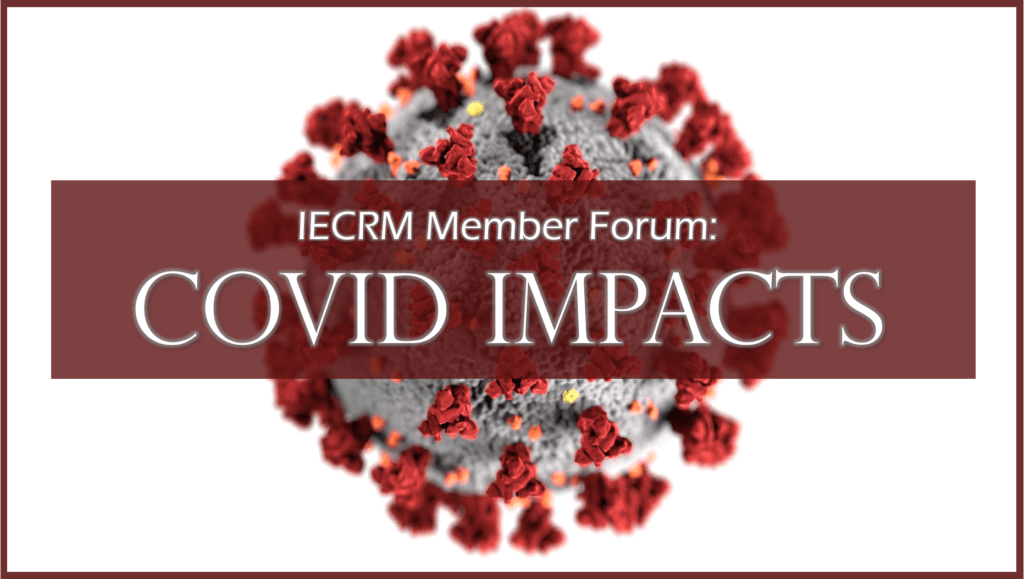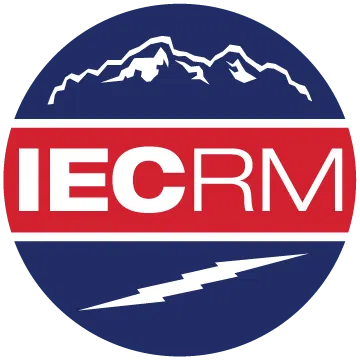MEMBER FORUM RECAP – Covid-19 – Long Term Business Impacts

MEMBER FORUM RECAP – Covid-19 – Long Term Business Impacts
Wednesday, September 2, 2020
7:30 AM – 8:30 AM
Hosted by IECRM
IECRM is honored to help you navigate through these unprecedented times during the COVID-19
pandemic. Below you will find a bulleted recap of the discussion and helpful links to resources mentioned
in today’s Member Forum.
Upcoming Member Forums: September 2, September 16, October 14, November 11, and December 9.
Register now to join the upcoming live discussions.
If you have any questions to ask of our subject matter experts, or suggestions for future Member Forums,
please contact IECRM CEO Marilyn Akers Stansbury at [email protected] or 303-848.2513.
Sign up for our free Online Member Forums here.
Watch the VIDEO RECORDING of this week’s forum.
Subject Matter Experts (SMEs) included:
- Kristin White, Attorney at Law
Fisher & Phillips, LLP
[email protected] | O: (303) 218-3658
https://www.fisherphillips.com/offices-denver
- Curt Olson, CPA, CCIFP, Senior Audit Manager
Wipfli LLP
[email protected] | O: (303) 759-0089
https://www.wipfli.com
- Brandon Gainer, Surety Specialist
Federated Insurance/Granite Re, Inc.
[email protected] | P: (405) 302-1313
- Joe Gottlieb, PEO Consultant
Oasis, a Paychex® Company
[email protected] | M: (408) 506-0738
- Megan Corey McMahon, PEO Consultant
Oasis, a Paychex® Company
[email protected] | M: (303) 668-9234
- Grant Loomis- Oasis, a Paychex® Company
Latest Updates from the Colorado Department of Health
- CDOL is broadening and getting even more aggressive about the information they are collecting about citizens, including the following regarding all employees in a company:
- Birthdates
- Addresses
- Phone numbers
- Symptoms
- The recommended guidance is to be aware of these requests and know you can push back on invasion of privacy/overreach concerns. Ask for specific requests in writing – not just a phone call – and reach out to counsel if you have questions or concerns.
- Paid Sick Leave
- New CDOL regulations and rulemaking hearings coming up this fall
- Contractors and industry-related businesses are encouraged to participate in the rulemaking process in September/October; make your voice heard
- Final rules will be out in November and will go into effect January 1, 2021
- IECRM is working with industry groups to plan a seminar on Paid Sick Leave changes in October. The October date is TBD.
- Overtime Rules
- The big challenge is tracking time from employees working from home because remote working is like being in the office. Breaks and time must still be managed and recorded.
- The big challenge is tracking time from employees working from home because remote working is like being in the office. Breaks and time must still be managed and recorded.
What’s Happening on the HR Front
- Short-term, the business environment is fluid; dealing with many changes
- Note that the FFCRA, the Cares Act and the expanded FMLA ends at the end of 2020. Guidance about expanding these programs is not yet known. See above reference regarding Paid Sick Leave implementation effective January 1, 2021.
- When work/child care schedules conflict, intermittent leave is now available; it is advised to work with employees to arrive at the best schedule to accommodate circumstances.
- Once there is a vaccine, there may be new rules about being vaccinated in order to go to work at a jobsite. What will the law or guidance be regarding vaccination? Or, what might transpire down the road?
- Federated Insurance offers an e-learning workshop that employees can participate in covering a number of different topics. https://www.federatedinsurance.com/home
- A big topic of this e-learning is social media and negative posting by employees, thus negatively impacting an employer’s business.
- With the amount of news in the media as well as social media, employees are being influenced in challenging ways including increased stress levels.
- Monitor employees, reach out to them, talk with them to make sure they are doing ok. Visit https://www.oasisadvantage.com/log-on/ As we move into fall and winter, days will be shorter, weather colder, darker earlier. Employers need to be proactive; keep an ear to the ground to determine if people are acting differently. Even in emails, if the tone changes, check in. Talk to them regularly by phone or video.
- Human interaction is essential to showing that you value your employees; recognition is very important.
- With social media, especially with younger employees, create written policies using CDC information. Be aware that in some cases, when an employee returns to work after having COVID, other employees may tend to ostracize that individual. Also, watch for drug and alcohol disorders. If you see a difference in behavior, ask questions. Get in their business a bit more, especially with those working from home.
- Benefits enrollment and updating employee handbooks needs to happen
- Plan for the new year
- Job seekers are evaluating how companies have and continue to handle the pandemic
- Some are looking to jump ship based on the robustness of the benefits package
Bid Bonding
- Bonding in a COVID environment is different now. This is a major change unlike any other since 2008. 2008-2012 was a hard market time for bonding. By the second half of 2012 bonding/surety went soft, softest in decades, making bonding easier to get.
- Bonds are a 3rd party guaranteeing that a contractor will perform to the letter of the contract.
- Currently, there is a shift in requiring bid bonds from subcontractors, creating a harder market again.
- Biggest factor now is that companies are requiring bonds that have never required them before.
- ADVICE: Be prepared and anticipate that you may be required to bond.
- GROSS MISCONCEPTION: small to midsize contractors may cringe about bonding, but once you go through the process it becomes easier. Bigger contracts require more detail than smaller contracts.
- Expect to see increases in bond requirements in 2021. The unknown is in regards to what the budgets will look like, where the money is coming from, and even private construction projects may begin to require bonds.
- One other thing: with a soft market large surety players dip down into smaller projects that are not in their niche.
- QUICK BOND PROGRAMS: these are credit-based. But, when the COVID shutdown occurred, companies suspended quick bonding.
- Partner with a bond company that recognizes and understands your market segment focus.
- Understand your capacity
- Recognize that your surety company looks at your backlog
- Understand cost-to-complete
Paycheck Protection Program
- Right now the pipeline is strong, anticipating that in 2021 jobs in construction may slow down a bit.
- Bonding companies view the PPP in a pretty fluid way. They are not taking stands on this yet.
- Some surety companies are assuming the PPP will be forgiven; others expect it to be paid back and move it from an asset to a liability
- As far as forgiveness, we are still waiting for more information
- Rules are still out for interpretation and some banks are reluctant to accept the forgiveness applications because they don’t know how it will affect them yet. SBA is accepting forgiveness applications.
- There is an EZ form to apply for forgiveness: if you have no change in FTE, you may use this form.
Social Security Tax Deferral
- There is a great deal of “wait and see” about how the next five months will go.
Additional Resources from our Subject Matter Experts:
Fisher Phillips:
Federated Insurance:
Additional COVID-19 Links
- State of Colorado COVID Resources https://covid19.colorado.gov/protect-our-neighbors – New Executive Order in DRAFT through 6/18/2020
- Department of Labor Families First information: https://www.dol.gov/agencies/whd/pandemic/ffcra-employee-paid-leave
- IECRM COVID-19 Updates and Resources (with links to all forum recaps and resources): /iecrm-covid-19-updates-resources/
